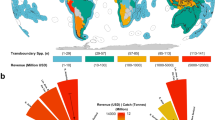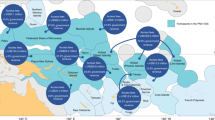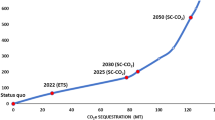Abstract
Climate change is driving fishery stocks out of their historical ranges. Along with the management challenge of species entering new jurisdictions, the exit of species from countries’ waters poses distinct threats to those resources and the economies that depend on them. We show that this risk is particularly acute in the tropics, where projected exits are highest and entries are fewest. We find that existing policy frameworks are poorly equipped for this challenge, and we suggest a way forward that draws on climate policy.
This is a preview of subscription content, access via your institution
Access options
Access Nature and 54 other Nature Portfolio journals
Get Nature+, our best-value online-access subscription
$29.99 / 30 days
cancel any time
Subscribe to this journal
Receive 12 digital issues and online access to articles
$119.00 per year
only $9.92 per issue
Buy this article
- Purchase on Springer Link
- Instant access to full article PDF
Prices may be subject to local taxes which are calculated during checkout


Similar content being viewed by others
Data availability
The species distribution maps used to generate the range-shift projections that informed our analysis are publicly available at https://www.aquamaps.org/. Datasets generated during and/or analysed during the current study are available from the corresponding author on reasonable request.
References
García Molinos, J. et al. Climate velocity and the future global redistribution of marine biodiversity. Nat. Clim. Change 6, 83–88 (2016).
Pinsky, M. L. et al. Preparing ocean governance for species on the move. Science 360, 1189–1191 (2018).
Mycoo, M. A. Beyond 1.5 °C: vulnerabilities and adaptation strategies for Caribbean Small Island Developing States. Reg. Environ. Change 18, 2341–2353 (2018).
King, A. D. & Harrington, L. J. The inequality of climate change from 1.5 to 2 °C of global warming. Geophys. Res. Lett. 45, 5030–5033 (2018).
Gaines, S. D. et al. Improved fisheries management could offset many negative effects of climate change. Sci. Adv. 4, eaao1378 (2018).
Golden, C. D. et al. Nutrition: fall in fish catch threatens human health. Nature 534, 317–320 (2016).
IPCC Special Report on Global Warming of 1.5 °C (eds Masson-Delmotte, V. et al.) (WMO, 2018).
Sustainable Fisheries Act: Amendments to the Magnuson–Stevens Fishery Conservation and Management Act 16 US Code Ch. 38 Sec. 1801 et seq. (US Government, 1996).
United Nations Convention of the Law of the Sea (UN, 1982).
Diekert, F. K. & Nieminen, E. International fisheries agreements with a shifting stock. Dyn. Games Appl. 7, 185–211 (2017).
The United Nations Agreement for the Implementation of the Provisions of the United Nations Convention of the Law of the Sea of 10 December 1982 Relating to the Conservation and Management of Straddling Fish Stocks and Highly Migratory Fish Stocks (UN, 1995).
Pentz, B., Klenk, N., Ogle, S. & Fisher, J. A. D. Can regional fisheries management organizations (RFMOs) manage resources effectively during climate change? Mar. Policy 92, 13–20 (2018).
Vulnerable Marine Ecosystems: Regional Fishery Bodies (FAO, 2019); https://go.nature.com/2UxqI6V
Flanagan, P. H., Jensen, O. P., Morley, J. W. & Pinsky, M. L. Response of marine communities to local temperature changes. Ecography 42, 214–224 (2019).
Memarzadeh, M., Britten, G. L., Worm, B. & Boettiger, C. Rebuilding global fisheries under uncertainty. Proc. Natl Acad. Sci. USA 116, 15985–15990 (2019).
Aqorau, T., Bell, J. & Kittinger, J. N. Good governance for migratory species. Science 361, 1208–1209 (2018).
Pershing, A. J. et al. Slow adaptation in the face of rapid warming leads to collapse of the Gulf of Maine cod fishery. Science 350, 809–812 (2015).
Vosooghi, S. Panic-based overfishing in transboundary fisheries. Environ. Resour. Econ. 73, 1287–1313 (2018).
Pudden, E. J. & VanderZwaag, D. L. Canada-USA bilateral fisheries management in the Gulf of Maine: under the radar screen. Rev. Eur. Community Int. Environ. Law 16, 36–44 (2007).
Adoption of the Paris Agreement FCCC/CP/2015/L.9/Rev.1 (UNFCCC, 2015).
Mechler, R. et al. (eds) Loss and Damage from Climate Change: Concepts, Methods and Policy Options. Climate Risk Management, Policy and Governance 1st edn (Springer, 2019).
Decisions adopted by the Conference of the Parties. Paris Agreement (UNFCCC, 2015).
Maritime Boundaries Geodatabase, Version 9 (Flanders Marine Institute, 2016); http://www.marineregions.org/
Acknowledgements
We thank D. Bradley, C. Cochran, D. Flores, S. Gaines, J. Lawson and Q. Lee for comments, suggestions and references. This work was supported in part by the David and Lucile Packard Foundation (grant number 2016-65300). J.G.M. is supported by the ‘Tenure-Track System Promotion Program’ of the Japanese Ministry of Education, Culture, Sports, Science and Technology (MEXT) and the JSPS KAKENHI, Grant Number 19H04322.
Author information
Authors and Affiliations
Contributions
K.L.O. conceived the idea with input from all of the authors. J.G.M. developed the species loss analysis. J.G.M. and T.M. conducted the species loss analysis. K.L.O., C.C., J.S. and J.B. designed the agreement analysis. J.B., T.M. and A.L. conducted the agreements analysis. K.L.O. wrote the manuscript with input from all of the authors.
Corresponding author
Ethics declarations
Competing interests
C.C. is on the Board of Trustees for two environmental NGOs: Environmental Defense Fund and Global Fishing Watch. The other authors declare no competing interests.
Additional information
Publisher’s note Springer Nature remains neutral with regard to jurisdictional claims in published maps and institutional affiliations.
Supplementary information
Supplementary Information
Supplementary Figs. 1 and 2, and methods.
Rights and permissions
About this article
Cite this article
Oremus, K.L., Bone, J., Costello, C. et al. Governance challenges for tropical nations losing fish species due to climate change. Nat Sustain 3, 277–280 (2020). https://doi.org/10.1038/s41893-020-0476-y
Received:
Accepted:
Published:
Issue Date:
DOI: https://doi.org/10.1038/s41893-020-0476-y
This article is cited by
-
Beyond boundaries: governance considerations for climate-driven habitat shifts of highly migratory marine species across jurisdictions
npj Ocean Sustainability (2024)
-
Ecosystem services valuation for supporting sustainable life below water
Sustainable Earth Reviews (2023)
-
Global patterns of sea surface climate connectivity for marine species
Communications Earth & Environment (2022)
-
Suggestions for marine protected area management in Australia: a review of temperature trends and management plans
Regional Environmental Change (2022)
-
Poleward bound: adapting to climate-driven species redistribution
Reviews in Fish Biology and Fisheries (2022)



